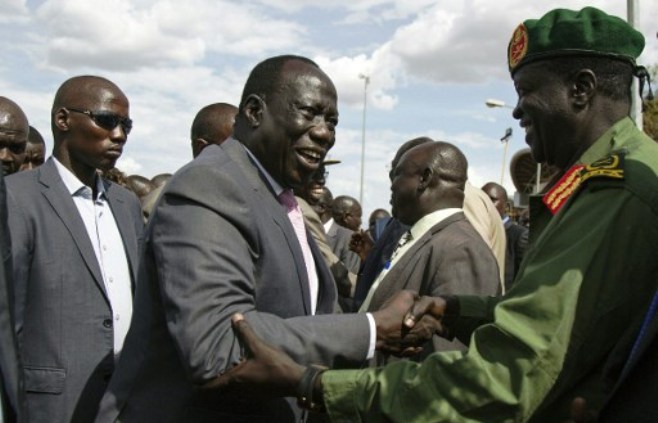SPLM-IO deputy chairman, Alfred Ladu, arrives in Juba
April 12, 2016 (JUBA) – The deputy chairman of the armed opposition faction of the Sudan Peoples’ Liberation Movement (SPLM-IO), Alfred Lado Gore, has arrived in Juba on Tuesday.

South Sudan’s government however prohibited the public from going to Juba airport to receive him. Gore however said his arrival to Juba is a testimony that peace implementation is “irreversible.”
Speaking to reporters after touching down at Juba airport on Tuesday, Lado said SPLM-IO’s top leader and first vice president designate, Riek Machar, will come to Juba next week on 18 April.
“Our advance team led by our chief negotiator, Taban Deng Gai, came here to proclaim peace, and I have come here today to reaffirm that peace,” said Lado, in a brief encounter with reporters at the airport.
He said despite the challenges facing smooth implementation of the peace agreement, he is optimistic that at last peace is possible.
“This peace will not be reversed, it will move forward,” he said.
He said the SPLM-IO will work with the government of President Salva Kiir to ensure that South Sudan returns to the path of development and unite the people.
“There is no way our unity should be doubted now, we have resolved to be together and continue to rebuild this country and it is important that this country occupies its space among the free nations in the world,” he added.
SPLM-IO MEDIA OFFICIALS ARRESTED
At least 16 members of the media team of the SPLM-IO’s advance team in Juba have been arrested by government’s security operatives and are still under detention and their whereabouts not yet known.
William Ezekiel, the spokesman of the advance team of the group inside South Sudanese national capital, Juba, described the arrests of the media team workers as “irresponsible.”
The group was arrested while sensitizing and attempting to mobilize the public to turn out for a reception of Gore as he was arriving to the country in preparation to receive Machar, who would become the first vice president in a unity government with President Salva Kiir.
Gore said he regretted the arrest of 16 members of the media team by national security, saying it was very unfortunate if it was connected to his reception.
“I don’t know the circumstances of their arrest. I hope today or tomorrow we should be able to find out why they were arrested. If it is because of my visit, then that is unfortunate,” said Gore.
He wondered what it means if people are not able to freely speak their minds.
Meanwhile Akol Paul, head of the government appointed committee charged with the reception of Gore and other members of SPLM-IO denied any knowledge of the circumstances under which they were arrested.
He assured that his participation in the reception demonstrated willingness of his group allied to president Kiir to implement the peace agreement.
“I heard about the issue of the people arrested. I wanted to tell you, as government committee that is responsible for the reception of all members of SPLM in opposition who are arriving, we have not received the report of arrest of 16 people but any issue of such will be looked by the committee and see what happens,” he said.
Presidential spokesperson, Ateny Wek Ateny, denied the team was arrested, saying they were allegedly summoned to explain why they embarked on the publicity campaign without alerting the national security.
Gore was received upon arrival at Juba airport by Taban Deng Gai, lead negotiator of his group during talks with the government and Akol Paul, the head of the reception committee on the side of the government.
Gore was accompanied by Edward Lino Wuor Abyei and several other members of the armed opposition on their return from neighbouring Kenya.
Gore, a known outspoken politician, affirmed commitment of his group to implementing the deal, saying “peace would not be reversed.”
“I don’t think we have to go back to the state of affairs we have been in before,” he told reporters.
“Now we are moving forward and we want our people to enjoy the freedom they have sacrificed their lives for almost 50 years,” he said.
(ST)
